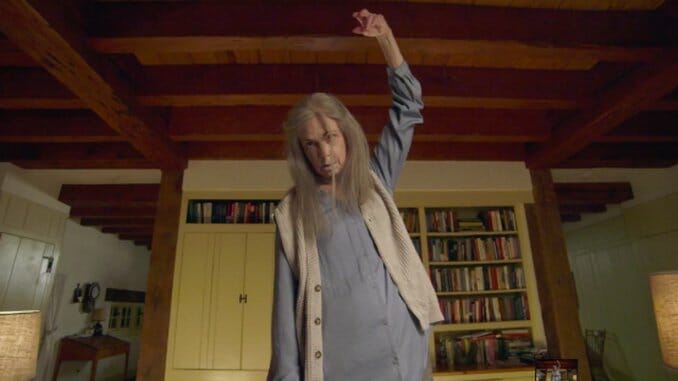The Visit

A trailer for the 2010 film Devil remains the only time that I’ve ever heard a movie theater audience laugh at the name of an executive producer when it was flashed on screen. It was quite the 180—up to the halfway point, the people around me seemed genuinely interested in a horror/suspense film set between strangers in a stranded elevator. Then, on the screen: “From the mind of M. Night Shyamalan,” and the entire audience burst into a unified laugh of collective derision. “Oh,” said the consensus. “Nevermind.” That’s the kind of reaction a director gets when his two preceding films are The Happening and The Last Airbender. That same director is also handed a big-budget sci-fi feature in Will Smith’s After Earth, but has his name completely hidden on the project’s advertising by Columbia. That’s cinematic rock bottom.
So yes, it’s safe to say that the public perception of Shyamalan has come a long, long way since he was being hailed as the next Alfred Hitchcock after The Sixth Sense and Unbreakable. His name has certainly been a punchline ever since somewhere around Lady in the Water in 2006, but the catch is that his films, regardless of quality, have invariably turned a profit in the end, largely thanks to foreign markets. Point is, the guy keeps getting a chance to make more movies, even as fewer and fewer optimistic film fans hold on to any hope that he could ever replicate his earlier success.
The Visit, Shyamalan’s latest, may in some ways be the entertaining return to form those audience members were waiting for, although it comes in an unexpected and fairly misleading package. Marketed as a straight horror film in an attempt to play on whatever Sixth Sense fondness still remains in the American public, the film is really more of a horror comedy, and a surprisingly able one. At its heart, this movie captures a new side of M. Night Shyamalan—an older, wiser, more playful, less somber, and thankfully more humble director who seems to have tamped down his urge to spew pseudo-profundities long enough to make a movie that is, for the most part, amusingly silly.
Our characters are 15-year-old Rebecca and 13-year-old Tyler, siblings who have been shipped away by Mom to spend a week with the grandparents they’ve never met before. Thanks to Mom’s painful falling out with her parents 15 years prior, the grandkids’ visit represents a chance for the family to possibly be healed. Sensing this opportunity, budding filmmaker Rebecca decides to create a documentary out of the experience, which gives us all the flimsy reasoning we need to make a found-footage feature. She even brings an extra camera for her brother and—lo and behold—that cast-off Walmart hand-cam shoots the exact same cinema-quality footage as her own. How convenient!
All is far from well, however, as grandparents John and Doris grow increasingly unstable, bizarre and potentially violent. And that’s really all you need to know of the plot. This is a Shyamalan feature where it’s for once more interesting to discuss the director’s intentions and filmmaking tricks than it is to simply dwell on the plot and the “twist.”
-

-

-

-

-

-

-

-

-

-

-

-

-

-

-

-

-

-

-

-

-

-

-

-

-

-

-

-

-

-

-

-

-

-

-

-

-

-

-

-








































